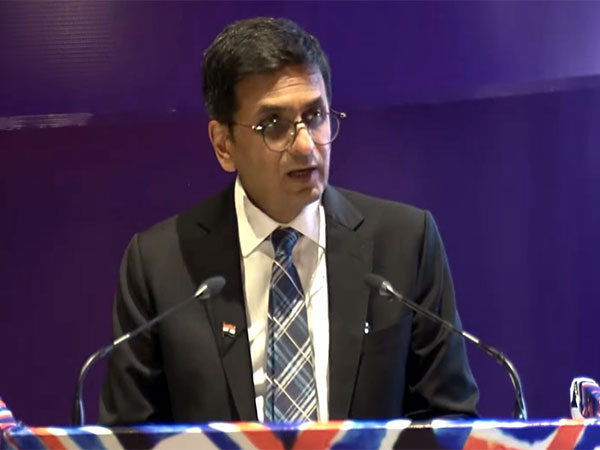New Delhi [India], April 1 (ANI): Chief Justice of India, DY Chandrachud on Monday, termed the three new criminal laws passed by the Parliament as a ‘significant’ step towards modernising the justice system.
The CJI said that the new laws encompass “substantive crime, procedure and evidence” and keeping a digital record of every stage of criminal investigation ensures a seamless flow of information.
He was speaking at the Central Bureau of Investigation (CBI) Raising Day in the national capital on Monday.
He also praised CBI holds a huge responsibility and the country’s judiciary has played an instrumental role in strengthening the body.
Addressing the event, CJI Chandrachud said, “A public institution is expected to show the highest regard for the public good and to be open to public accountability by showcasing its performance. The CBI is being increasingly asked to delve into a diverse array of criminal cases beyond its role as an anti-corruption investigative agency. This places a huge responsibility on the CBI to live up to its motto of ‘Industry, Impartiality, and Integrity.'”
“Courts have been instrumental in strengthening the CBI. Initially, its jurisdiction was primarily focused on cases related to corruption, economic offences, and serious crimes that crossed state borders,” he added.
The Chief Justice further said that as the years progressed, the CBI saw a significant expansion in its jurisdiction which empowered the agency to investigate diverse cases, ranging from economic frauds and bank scams to financial irregularities and terrorism-related incidents.
Emphasising on the digital era, he said that the current challenges mean that the law enforcement agencies like the CBI face new and complex challenges that demand innovative solutions.
“In an era of digital transformation, we find ourselves at a critical juncture. The interplay between law and technology holds immense potential to shape the course of crime detection at all three phases and going beyond it, in addressing wider perspectives in criminal justice reform. The landscape of crime is evolving at an unprecedented pace as our world becomes increasingly interconnected through the expansion of digital technologies,” Chandrachud said.
“From cybercrime and digital fraud to the exploitation of emerging technologies for illicit purposes, law enforcement agencies like the CBI are faced with new and complex challenges that demand innovative solutions. The investigating agencies have to keep up with the radical change in crime in a digitally connected world, to solve complex crime patterns,” he added.
Speaking about the three new criminal laws passed by the Parliament, he said that the new laws aim at digitising various aspects of criminal procedure.
“The new criminal laws enacted by Parliament encompass substantive crime, procedure and evidence. These laws aim at digitising various aspects of criminal procedure. This is a significant step towards modernising the justice system. From the initial registration of a First Information Report to the final delivery of judgement, every stage of a criminal investigation is slated to be recorded digitally under the purview of the proposed legislation,” Chandrachud said.
“This comprehensive approach ensures a seamless flow of information and is intended to facilitate better coordination and collaboration among stakeholders involved in the investigative and adjudicatory processes,” he added.
The three laws — Bharatiya Nyaya Sanhita (BNS), Bharatiya Nagarik Suraksha Sanhita, and Bharatiya Sakshya Sanhita — were passed by the Indian Parliament, on December 21, 2023, which there upon received Presidential assent on December 25, 2023 and was published in the official gazette on the same day.
The Ministry of Home Affairs notified in February that the three laws shall come into force on July 1, 2024.
Speaking at the event, the Chief Justice further said that the challenge remains for CBI to dispose cases in a ‘time-bound’ manner despite enormous challenges present.
“The challenge now lies in disposing of CBI cases in a time-bound manner despite the enormous challenges of complexification, pendency, and examination of witnesses,” he said. “Delay in prosecutions is one of the common and grave concerns of the justice delivery mechanism.”
Speaking about the emergence of Artificial Intelligence, CJI Chandrachud said that the technology can be effectively used by the law enforcement agencies.
“Artificial intelligence stands out as a game-changer in revolutionising criminal investigations. By leveraging AI algorithms, law enforcement agencies like the CBI can analyse vast amounts of data rapidly, identifying trends, anomalies, and potential leads with unprecedented accuracy,” Chandrachud said.
“Furthermore, AI aids in the de-complexification of crimes, breaking down intricate cases into manageable components for analysis and resolution,” he added. (ANI)
Disclaimer: This story is auto-generated from a syndicated feed of ANI; only the image & headline may have been reworked by News Services Division of World News Network Inc Ltd and Palghar News and Pune News and World News
HINDI, MARATHI, GUJARATI, TAMIL, TELUGU, BENGALI, KANNADA, ORIYA, PUNJABI, URDU, MALAYALAM
For more details and packages











